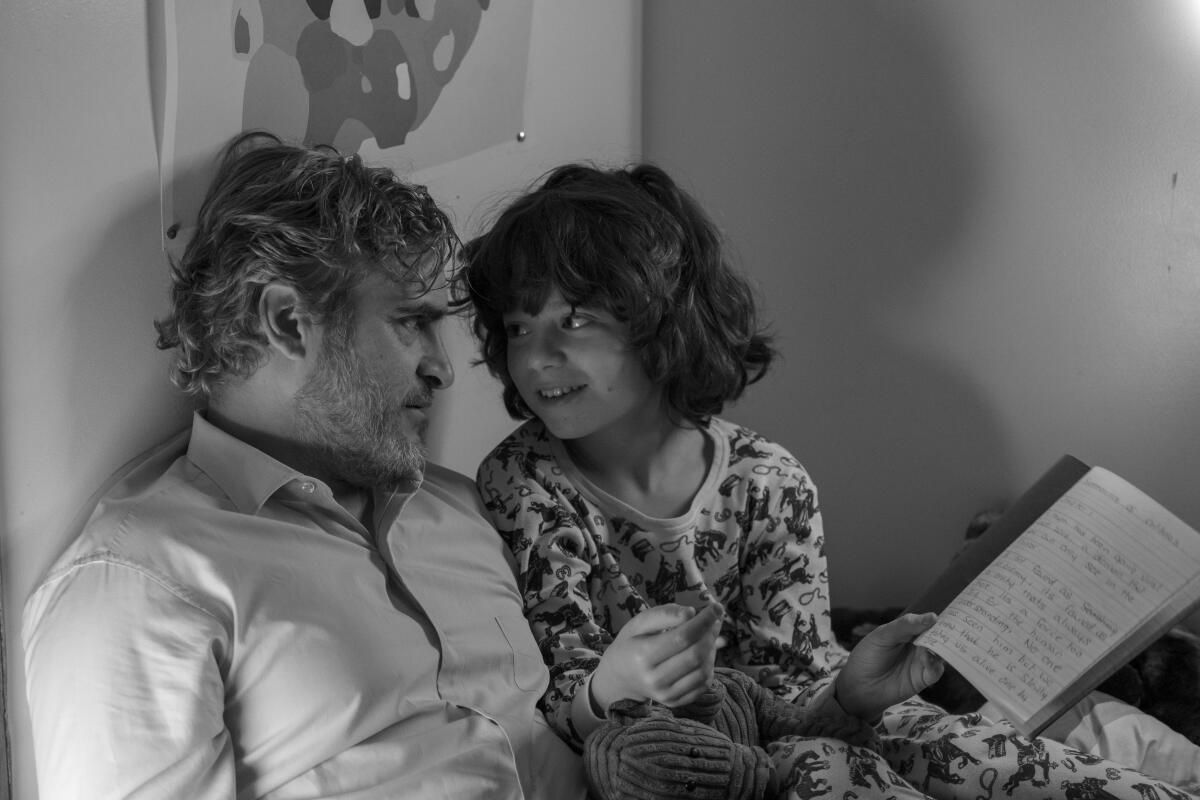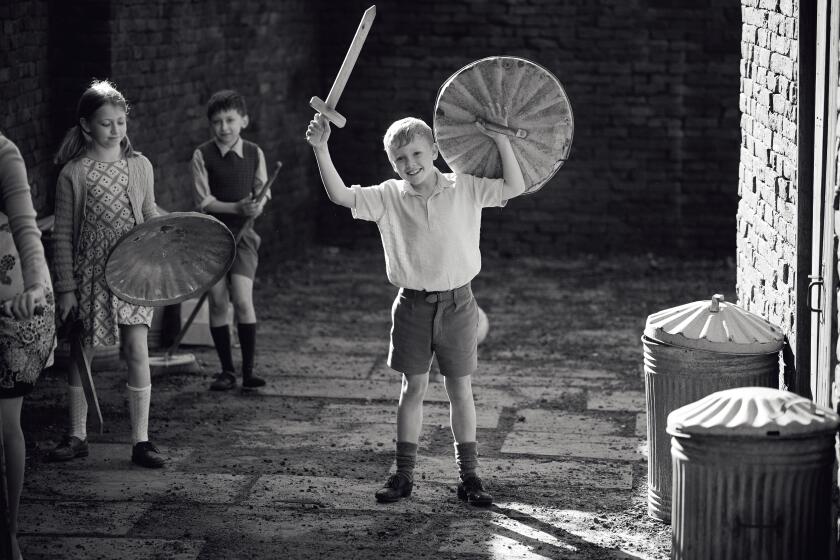Kids say the darndest things — when film directors let them

Making a film requires a good deal of courage, along with a great script and cast. But writers and directors who choose to center their narrative on young people require an extra measure of bravery. Kids can add a lot of value to the story — humor, pathos, sheer cuteness — but the script has to first come up to meet them.
And then the director has to be ready to throw that script out the window.
This is something Joaquin Phoenix seemed particularly aware of when he signed on to work with writer-director Mike Mills on “C’mon C’mon,” which looks at the intense bond between Johnny (Phoenix) and his young nephew, Jesse (Woody Norman), that develops as they travel around America. Mills — who has scripted all of his films — may have been confident in his narrative, but he admits that the whole film was “hypothetical” until they had the right child in the part of Jesse.
“It’s like getting married,” says Mills. “We were both like — Joaquin was especially like — ‘Show me the kid. And then maybe this will happen.’”
In such films as ‘Belfast’ and ‘C’mon C’mon,’ young actors find their films can be ‘scary,’ ‘fun’ and ‘important.’
No matter how strong a script is, having a real live child assigned to the part can crack it open again. Kids add complexity and exponential moving parts to the already fraught process of making a film — yet it’s a journey that multiple filmmakers are taking this awards season, including “C’mon,” “Encounter,” “CODA,” “Belfast,” “Stillwater” and “Blue Bayou,” to name a few. And making young people the center in any given story is a learning process for the director-writers as much as the performers.
“A bad child performance can really stand out on screen and hurt a film,” says writer-director Michael Pearce, whose “Encounter” revolves around a war veteran (Riz Ahmed) attempting to find a safe haven for his children (Lucian-River Chauhan and Aditya Geddada) from what he believes are alien parasites . “You have to work slightly differently when you’re working with kids. Naturally, kids have less acting experience than adults — they haven’t done a drama postgraduate or a couple of movies.”
That process starts on the page, where screenwriters aim to craft realistic children’s dialogue and action while avoiding turning them into mini-adults. Still, it’s a slippery slope — there’s a reason so many on-screen children are written as “precocious” or “prodigies.” But an adult writing for a child, even a teenager, risks assuming they know how the young person cast will think or sound once the cameras turn on.
“There is a way people write teenagers that has become almost a habit,” says writer-director Sian Heder, whose “CODA” tells the story of hearing teenager Ruby (Emilia Jones) breaking away from her Deaf family. “Just a few things that indicate ‘teenage behavior.’ Tropes are tropes because they’re often based in truth, but the specificity of a character is always a thing that does it for me. It’s not just how you write a teenager, but how do you write this teenager.”
Directors who don’t understand specificity, or who treat their youngest cast members like full adults, risk eliciting a technically perfect performance without any deeper connection.
“A problem I’ve observed with adult directors guiding young actors is they are sometimes abrupt in their demands,” says writer-director Kenneth Branagh in an email. His semiautobiographical “Belfast” features Jude Hill as Buddy, a boy caught up in the civil war strife of the titular Northern Irish city. “When the young person doesn’t come up with the results swiftly, the pressures of film schedules lead [directors] to essentially ‘bribe’ the young actor to understand and perform ASAP. That never works. You have to be very, very, very patient. And canny.”
How that canniness expresses itself may have little to do with what’s literally on the page. In “Stillwater,” writer-director Tom McCarthy showed an Oklahoma father in France (Matt Damon) bonding with his French girlfriend’s daughter, Maya (Lilou Siauvaud), without real dialogue, since the two didn’t share a common language. In one scene, Damon’s character talks to Maya about his job back home while fixing a toilet.
“You can tell she’s fascinated with watching this guy talk,” says McCarthy. “The fact that they don’t speak the same language means they have to find different ways to communicate. They both pretend a little bit in their understanding of each other.”
Equally important is the value of improvisation, another element that can’t be planned for in the script. “Economy was king,” writes Branagh of writing for his young cast. “Less dialogue … Prepare people with trust and love, but don’t give them too much time to think ahead. You want the thinking caught on camera, live, as it’s happening.”
Yet it’s also important to ground young actors with some level of understanding of what’s happening on screen. Justin Chon, who wrote, directed and starred in “Blue Bayou,” a story about a Korean man raised in America facing deportation and the loss of his white American wife and stepdaughter, explains that’s how he worked with young Sydney Kowalske (Jessie).
“We rehearsed for quite some time, and a lot of that time we spent playing and improvising,” he says in an email. “I explained why certain scenes existed and gave her a sense that she could do no wrong. Then I suggested ideas that brought her back to the scene I wrote so it felt like it was her idea and not a direction.”
“You start with acknowledging your visitor-ness [to children’s experiences],” says Mills. “It’s about coming up with ideas and listening, then taking things.”
He recalls one moment of improvisation between Phoenix and Norman that sums it up nicely: Jesse has just asked his uncle what he should call him, and Johnny casually suggests “Jesus Christ.” “And Woody goes, ‘I’m not Christian,’ just like that,” marvels Mills. “Stuff like that, we’re like, ‘OK!’ The Joker just made a joke to him, and Woody didn’t even blink. So, that’s gold. You know?”
More to Read
From the Oscars to the Emmys.
Get the Envelope newsletter for exclusive awards season coverage, behind-the-scenes stories from the Envelope podcast and columnist Glenn Whipp’s must-read analysis.
You may occasionally receive promotional content from the Los Angeles Times.











